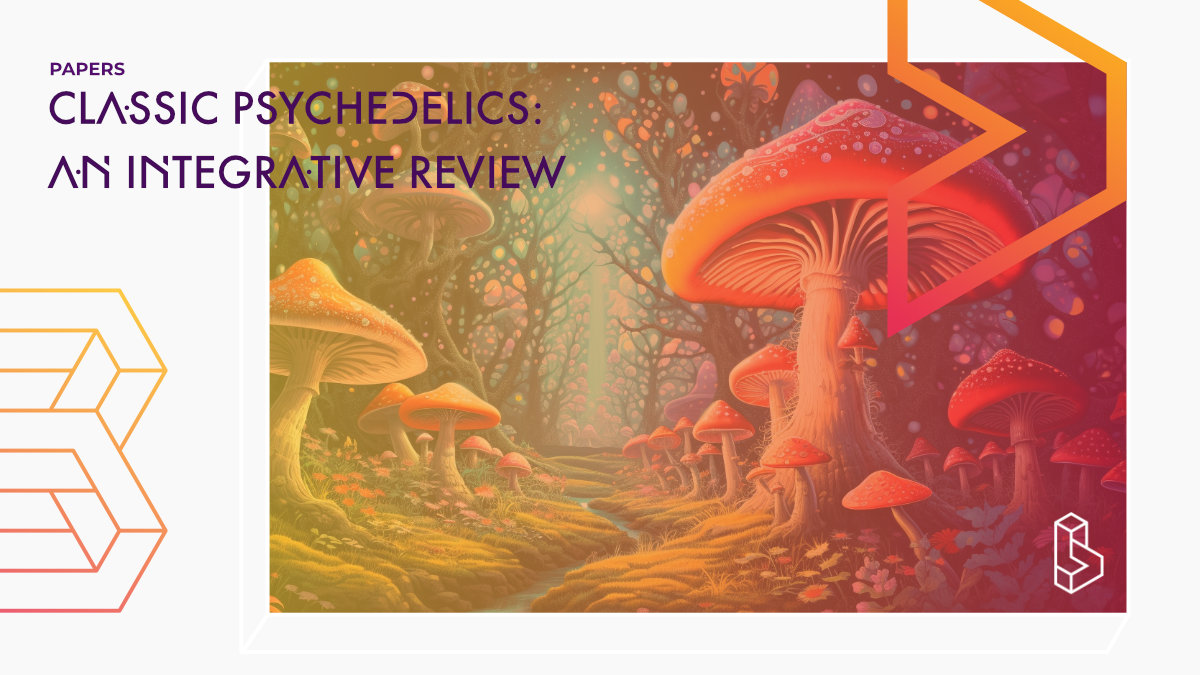This comprehensive review (2019) by some of the leading researchers in psychedelics looks at both the epidemiological & clinical studies and the positive (and negative) effect that psychedelics can have.
Abstract of Classic psychedelics
“The purpose of this paper is to provide an integrative review and offer novel insights regarding human research with classic psychedelics (classic hallucinogens), which are serotonin 2A receptor (5-HT2AR) agonists such as lysergic acid diethylamide (LSD), mescaline, and psilocybin. Classic psychedelics have been administered as sacraments since ancient times. They were of prominent interest within psychiatry and neuroscience in the 1950s to 1960s, and during this time contributed to the emergence of the field of molecular neuroscience. Promising results were reported for treatment of both end-of-life psychological distress and addiction, and classic psychedelics served as tools for studying the neurobiological bases of psychological disorders. Moreover, classic psychedelics were shown to occasion mystical experiences, which are subjective experiences reported throughout different cultures and religions involving a strong sense of unity, among other characteristics. However, the recreational use of classic psychedelics and their association with the counterculture prompted an end to human research with classic psychedelics in the early 1970s. We provide the most comprehensive review of epidemiological studies of classic psychedelics to date. Notable among these are a number of studies that have suggested the possibility that nonmedical naturalistic (non-laboratory) use of classic psychedelics is associated with positive mental health and prosocial outcomes, although it is clear that some individuals are harmed by classic psychedelics in non-supervised settings. We then review recent therapeutic studies suggesting efficacy in treating psychological distress associated with life-threatening diseases, treating depression, and treating nicotine and alcohol addictions. We also describe the construct of mystical experience, and provide a comprehensive review of modern studies investigating classic psychedelic-occasioned mystical experiences and their consequences. These studies have shown classic psychedelics to fairly reliably occasion mystical experiences. Moreover, classic-psychedelic-occasioned mystical experiences are associated with improved psychological outcomes in both healthy volunteer and patient populations. Finally, we review neuroimaging studies that suggest neurobiological mechanisms of classic psychedelics. These studies have also broadened our understanding of the brain, the serotonin system, and the neurobiological basis of consciousness. Overall, these various lines of research suggest that classic psychedelics might hold strong potential as therapeutics, and as tools for experimentally investigating mystical experiences and behavioral-brain function more generally.”
Authors: Matthew W. Johnson, Peter S. Hendricks, Frederick S. Barrett & Roland R. Griffiths
Notes on Classic psychedelics
This paper is included in our ‘Top 10 Articles for Psychedelic Novices‘
Summary of Classic psychedelics
The serotonin 2A receptor (5-HT2AR) is the most important receptor underlying classic psychedelic effects. 5-HT2A receptor knockout mice do not exhibit the head-twitch response, a characteristic rodent response to classic psychedelics. The primary role of 5-HT2A R agonism in classic psychedelic effects is probably due to 5-HT2C receptors, but other receptor-level mechanisms also contribute to classic psychedelic effects. Additionally, classic psychedelics upregulate immediate early genes that encode for transcription factors that in turn regulate multiple genes. Classic psychedelics include variations on the structure of tryptamine, such as LSD, psilocybin, and DMT, and phenethylamine, such as mescaline, which occurs naturally in some cacti. MDMA, a synthetic analog of phenethylamine, causes psychoactive effects with only partial overlap with classic psychedelics.
Classic psychedelics cause extreme changes in subjective experience during acute drug action, encompassing complex changes in affective, cognitive, and perceptual domains. One type of subjective experience referred to as mystical-type experience can be occasioned by administration of relatively high doses of classic psychedelics in optimal settings. The term “hallucinogen” is not ideal for classic psychedelics because it connotes only perceptual effects, and the term “psychedelic” is a better description of the often radical effects these drugs have on human consciousness and one’s sense of self.
Find this paper
https://doi.org/10.1016/j.pharmthera.2018.11.010
Paywall | Google Scholar | Backup | 🕊
Cite this paper (APA)
Johnson, M. W., Hendricks, P. S., Barrett, F. S., & Griffiths, R. R. (2019). Classic psychedelics: An integrative review of epidemiology, therapeutics, mystical experience, and brain network function. Pharmacology & therapeutics, 197, 83-102.
Authors
Authors associated with this publication with profiles on Blossom
Peter HendricksPeter Hendricks is a Professor in the Department of Health Behaviour at the University of Alabama. Hendricks's area of expertise lies in substance abuse treatment and prevention.
Matthew Johnson
Matthew Johnson is an Associate Professor of Psychiatry and Behavioral Sciences at Johns Hopkins University. His research is concerned with addiction medicine, drug abuse, and drug dependence.
Frederick Barrett
Frederick Streeter Barrett is an Assistant Professor of Psychiatry and Behavioral Sciences and works at the Johns Hopkins University Center for Psychedelic and Consciousness Research.
Roland Griffiths
Roland R. Griffiths is one of the strongest voices in psychedelics research. With over 400 journal articles under his belt and as one of the first researchers in the psychedelics renaissance, he has been a vital part of the research community.

